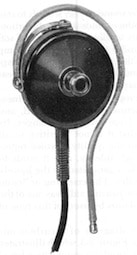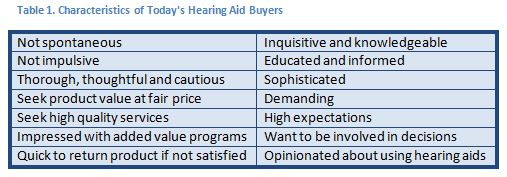Last week Dr. Northern weighed in on the viability of Audiology as a profession in the previous posts in the series. Today he looks at what Audiologists are facing right now{{1}}[[1]]Readers are also encouraged to read Tom Northey’s predictions of Audiology’s future.[[1]]and sets his sights on consumers who may, or may not, purchase hearing aids from Audiologists. We welcome his vast experience and insights into present-day conundrums faced by consumers and the Audiologists who wish to serve them.
Painful Conversations
I answered the telephone recently to hear my old college roommate exclaiming wildly, and at length:
“Do you know that audiologist you referred me to wants more than $6,000 for a pair of hearing aids? What’s with that? I can buy the best computer for less than $2,000; my Smartphone, complete with a fabulous camera and who knows how many apps, only cost $199 or I can buy a 65” HD television set for around $2,000! I don’t need all those fancy hearing aid features he wants to sell me – I just want to hear a little better! Is it any wonder that no one wants to buy hearing aids? You know, I can buy hearing aids online for a fraction of that price or I can go to Costco and save a bundle for the same kind of hearing aids?”
I wish that were the only such conversation I have had lately, but it poses questions that are becoming more and more difficult to answer easily. I have talked with nearly a dozen potential hearing aid buyers in this past year and they raise many of the same questions as my college roommate.
What do I say to my elderly widow neighbor who asks me where is the best (and I know she means ‘least expensive’) place where she can buy new hearing aids? Her current aids are about 10 years old and she wants to get replacements.
What do I tell her when she next asks me about getting her new hearing aids at Costco? In these conversations it is apparent that these potential buyers are not only puzzled about where to go for their hearing test and amplification devices but that their online searches have only added to their confusion.
Due Diligence in a Sea of Confusion
These discussions suggest to me that today’s hearing aid buyers are actually more sophisticated than I have previously recognized. They are trying to do their due diligence prior to making their purchase, but they are finding a hearing aid world that is far from easy to navigate. It is well acknowledged that hearing aid buyers do not follow traditional retail practices.
Hearing aids are not bought with a spontaneous attitude of, Oh-I-can’t-wait-to-get-one; let’s-go-to-the-mall-I-need-a-hearing aid; stop-here– I-see-a-hearing-aid-office.
Today’s purchases of any major item are often preceded by considerable research, either by asking for others’ opinions, online searches, or checking the many available consumer reviews and reports. And, as always, price is an important consideration. Today’s hearing aid buyers show many, if not all, the characteristics identified in Table 1:
Utility Versus Technology
In my conversations with these potential buyers, I attempt to justify the cost of hearing aids by starting to describe the incredible features that these tiny hearing aid devices provide the wearer. However, it is not long before I see their eyes glaze over and the inevitable question follows:
“Do I really need all those things in my hearing aids?”
Today’s buyers believe that those automatic advanced features should be included in ALL hearing aids and they do not expect to pay extra for them.
*Tune in next week for Dr. Northern’s concluding remarks.
Jerry L. Northern, PhD, is Professor Emeritus at the University of Colorado School of Medicine where he served as head of the Audiology Department for more than 26 years. Dr. Northern, a native of Denver, is a prolific writer and editor of several professional journals; he has authored a dozen textbooks in the areas of hearing and hearing disorders, including six editions of Hearing in Children and three editions of Hearing Disorders. Internationally known for his expertise in pediatric audiology, his professional background includes clinical practice, teaching, medical-legal industry experience, clinical and basic research, as well as consulting in nearly 30 countries. Dr. Northern is a founding member of the American Academy of Audiology and served as the organization’s third president. He has been honored by numerous organizations for his contributions to the field of audiology and can be reached at [email protected].
images courtesy of executive board and langue or parole










The readers of Dr. Jerry Northern’s excellent blog are encouraged to read an article by Sergei Kochkin on improving their client’s Multiple Environmental Listening Utility https://journals.lww.com/thehearingjournal/Citation/2007/11000/Increasing_hearing_aid_adoption_through_multiple.6.aspx and his most recent article in the Hearing Review on how hearing loop technology http://www.hearingreview.com/2014/09/consumer-perceptions-impact-inductively-looped-venues-utility-hearing-devices/
Of course consumers are wary – word on the street is that hearing aids don’t work. It is not that hearing aids don’t work – there is plenty of evidence out there they do – but that they have their limitations and tend to work best in quieter and near-field listening situations. But it also true that in the many public places where the consumer needs their hearing aids to work their devices are unable to deliver. The study of over 800 users in the October Hearing Review makes it VERY clear that loops can deliver and in some situations allow the user to hear better than the normal hearing person sitting beside them. This delights users – read what they have to say here: https://www.loopwisconsin.com/PDFFiles/Own%20_words.pdf
While loops are not a panacea for many of the issues that Dr. Northern raises, providers would do well to become involved in looping their communities as one way to set themselves apart in their communities. In doing so they increase the value of their services because they dramatically increase consumer satisfaction by raising the MELU of the instruments they fit.
Thanks for the helpful information you share with the public in your blogs and Facebook page. With all the controversies you have been covering lately, it’s clear that the face of hearing/technology is changing. Another sign of more empowered and inquisitive customers is the National Hearing Test, a do-it-yourself hearing test that will interest all your readers. The National Hearing Test was developed with funding from the NIH, is a wonderful tool and a great first step in taking control of one’s hearing health. It is is a validated non-profit hearing test people take over their own phone. The National Hearing Test provides millions of Americans with hearing loss with an easy, quick, inexpensive way to assess their hearing health in privacy, right from home. Please take a minute to look at our web site, http://www.nationalhearingtest.org. If you agree that the National Hearing Test is a great resource, please help us make everyone concerned with hearing health aware of it. For more information, contact us. Again, thanks for the good work you do.